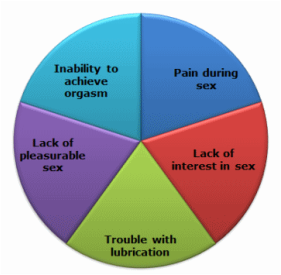Sexual Dysfunction

Sexual dysfunction refers to a problem occurring during any phase of the sexual response cycle that prevents the individual or couple from experiencing satisfaction from the sexual activity. The sexual response cycle traditionally includes excitement, plateau, orgasm, and resolution. Desire and arousal are both part of the excitement phase of the sexual response.
While research suggests that sexual dysfunction is common (43 percent of women and 31 percent of men report some degree of difficulty), it is a topic that many people are hesitant to discuss. Because treatment options are available, it is important to share your concerns with your partner and health care provider.
Dysfunction Types
Sexual dysfunction generally is classified into four categories:
- Desire disorders —lack of sexual desire or interest in sex
- Arousal disorders —inability to become physically aroused or excited during sexual activity
- Orgasm disorders —delay or absence of orgasm (climax)
- Pain disorders — pain during intercourse
causes
Physical causes — Many physical and/or medical conditions can cause problems with sexual function. These conditions include diabetes, heart and vascular (blood vessel) disease, neurological disorders, hormonal imbalances, chronic diseases such as kidney or liver failure, and alcoholism and drug abuse. In addition, the side effects of some medications, including some antidepressant drugs, can affect sexual function.
Psychological causes — These include work-related stress and anxiety, concern about sexual performance, marital or relationship problems, depression, feelings of guilt, concerns about body image, and the effects of a past sexual trauma.
Physical causes — Many physical and/or medical conditions can cause problems with sexual function. These conditions include diabetes, heart and vascular (blood vessel) disease, neurological disorders, hormonal imbalances, chronic diseases such as kidney or liver failure, and alcoholism and drug abuse. In addition, the side effects of some medications, including some antidepressant drugs, can affect sexual function.
Psychological causes — These include work-related stress and anxiety, concern about sexual performance, marital or relationship problems, depression, feelings of guilt, concerns about body image, and the effects of a past sexual trauma.


